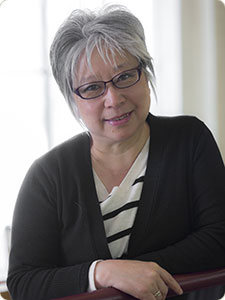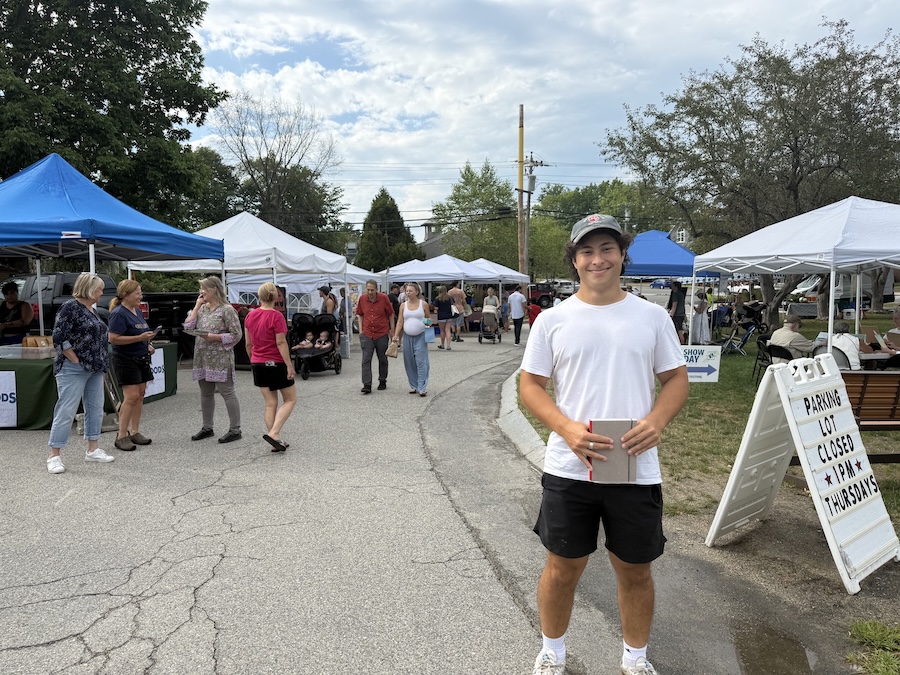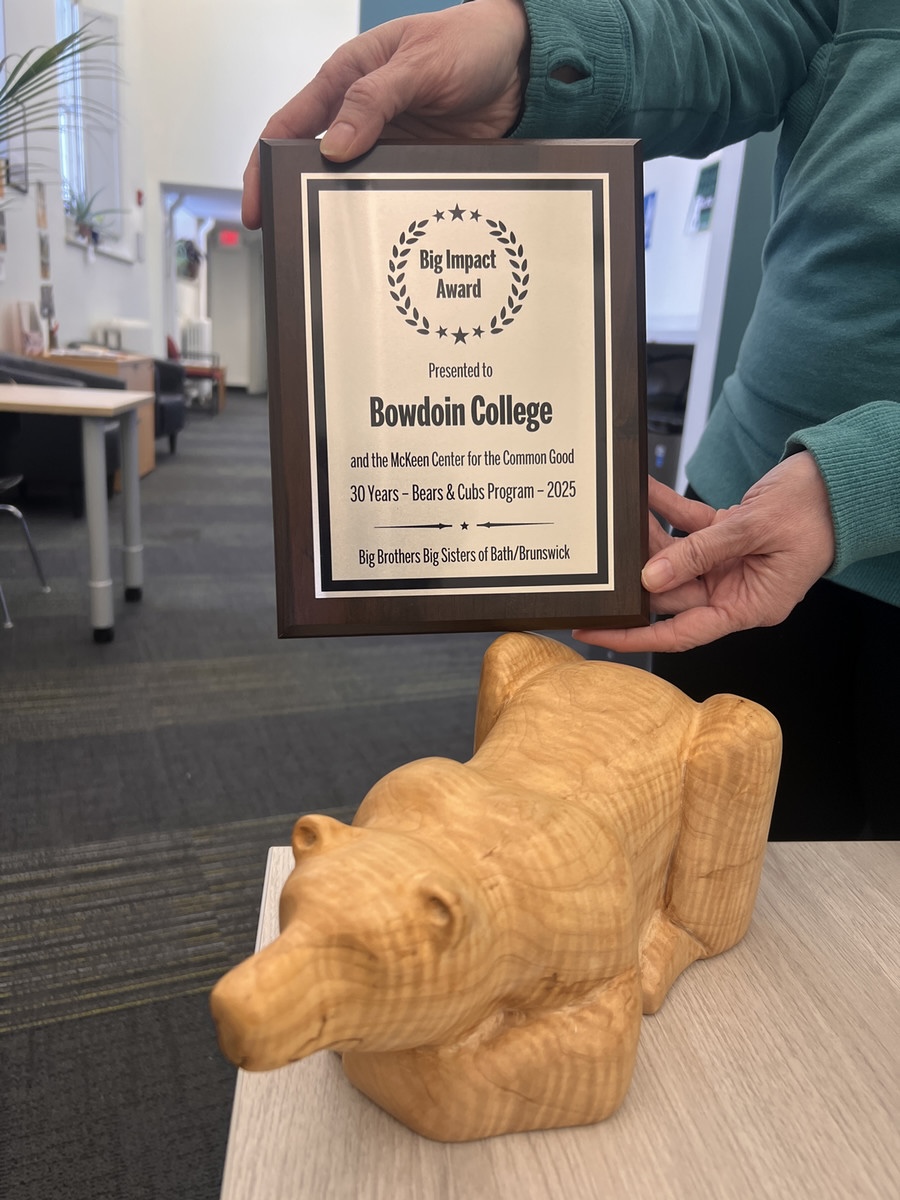From Classroom to Local Community: Students Forge Environmental Connection through the Camera
By Rebecca GoldfineAt the end-of-semester screening of the student final films, Tsui dimmed the lights in the Beam Classroom and pressed play on the first video of the night: Water Bottles, by Zander Gilman ’24 and Jillian Horton ’24.
The movie begins by presenting staggering statistics on plastic waste littering the land and seas around the globe. It then redirects its focus to Bowdoin, examining the efforts the College is taking to limit plastic use and create a sustainable campus.
The piece is investigative, newsy, and curious. Tsui praised it for its relative brevity: it clocked in at just under five minutes. "You can get across a lot of information in a short amount of time," she reminded students.
The festival's longest work, at over eleven minutes, Change and Continuity: Vinalhaven explores a small island with a population of around 1,135 that has an economy built on fishing and tourism. The film weaves together interviews with islanders—young and old—and stunning cinematography of island scenes, including the downtown, lobster boats, and the sea.
It was created by Mason Daugherty ’25, Seamus Goulden ’24, Melissa Su ‘24, Glenn Rice ’25, and Emi Schneider ’24. Daugherty, who took on the role of film producer, has moviemaking experience: he spent last year—a gap year between high school and college—as a professional filmmaker. (He also won the grand prize in the 2019 C-SPAN StudentCam Documentary Competition.)
The inspiration for Vinalhaven was sparked when Daugherty first visited the island with ten other students during his McKeen Center community immersion orientation trip in August. "We did some service work, including trail work and aquaculture, and throughout we had a lot of interaction with the community," he said. "It was so unique, more than many of the places I’ve traveled to, and that is partially what drew me in. Even before I knew what the eco-cinema class was about, I thought maybe I should revisit these people."
When Tsui gave students the option to either write a paper or make a short film that reflects class themes for the final assignment, he knew instantly where he would go. "This is a community defined by its environment," Daugherty said.
Daugherty and his team spent one weekend in November on Vinalhaven, conducting ten hours of interviews and getting shots of the area. The weather was variable throughout their two days there, which Daugherty said worked to their advantage, making the film seem like it covers a longer time period.

They stayed with a former island teacher they met during Daugherty's orientation trip, and he helped introduce them to others. Their interviewees range from a woman in her nineties to a teenager.
"We thought of this film in three segments—past, present, and future—so we wanted people who embodied those three," Daugherty said.
Over the course of the semester, Tsui taught her students "the language of filmmaking" through watching and analyzing twelve movies, both documentaries and feature films, and reading associated texts. The primary reading is from Tsui's new book project, Ecological and Environmental Turns:(Re)mapping China's Landscape through the Lens of Camera. The book was inspired by her eco-cinema course.
Their film assignment—to implement eco-criticism as a perspective and eco-cinema as a visual language—gave them the opportunity to head into the real world to see firsthand how the environmental crisis is affecting people, Tsui said, and to hear personal stories.
The other student filmmakers explored hydroelectric energy, oysters, and Bowdoin's new Mills Hall-Gibbons Center, which is being built this year. "We had a unique opportunity to take a look at the construction as it was happening," the movie's makers Rin Osathanugrah ’24, Nicholas Huang ’24, and Adi Pall-Pareek ’24 said. "We could focus on the moment."
The short film Together, by Zoe Uhr ’24, features interviews with two Bowdoin professors, one in the sciences and other in the humanities: Collin Roesler, professor of earth and oceanographic science, and Doris Santoro, professor of education.
Uhr said choosing these two faculty members was a response to a recurring class topic—the importance of including different perspectives in storytelling. She added: "I love hearing about people's relationship to nature and how it changes."
And though climate change imperils the world as we know it, several people the students interviewed in their films share some hope, or at least a bit of perspective.
"I have no worries about the Earth," Roesler said. "The Earth will be fine. The Earth has had change throughout its entirety. There are always winners and losers through evolution and catastrophic change, but the Earth always finds new equilibrium...The Earth will recover from whatever assaults we put on it." She paused and added, "maybe not in our lifetimes."
Wes Reed, a realtor and sculptor interviewed in Vinalhaven, told the students: "I am optimistic that we have enough good people around that we will persevere."
Prof. Shu-chin Tsui's eco-film class watched these twelve films over the course of the semester: Back to 1942 (2012), Aftershock (2012), Waking the Green Tiger (2011), Manufactured Landscape (2006), Still Life (2006), Behemoth (2015), Plastic China (2016), Under the Dome (2015), 76 Days (2020), Kekexili: Mountain Patrol (2004), Wolf Totem (2015), and Earth (2007).
Student films from the fall semester class can be watched on Panopto.



